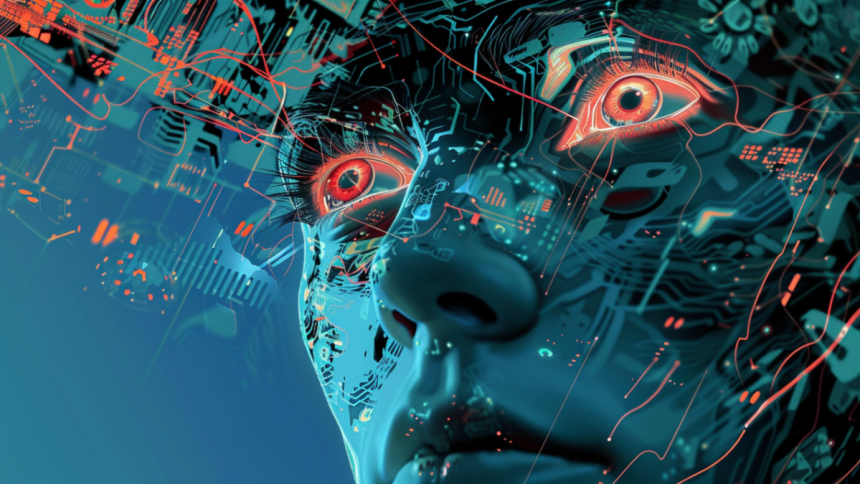Artificial intelligence
Artificial Intelligence (AI) is related to the simulation of human intelligence in machines that are engineered to think, adapt, and perform tasks that typically require human cognitive abilities. AI systems are created to process vast amounts of data, recognize patterns, make decisions, and solve problems with minimal human intervention. This new technology inculcates a wide range of applications, from everyday tools like virtual assistants and recommendation systems to more advanced fields such as robotics, autonomous vehicles, and medical diagnostics. AI is often divided into two types: narrow AI, which is specialized for specific tasks, and general AI, which aims to perform any intellectual task a human can do.
How generative AI works
Generative AI is a sub type of artificial intelligence that keeps it’s focus on creating new content, whether it’s text, images, music, or other forms of media. Not like the traditional AI, which is created to do specific tasks or make predictions based on existing data, generative AI models are trained to generate new data that resembles the original training data. These models, like Generative Adversarial Networks (GANs) and Transformer-based models (e.g., GPT), use complicated algorithms and deep learning processes to learn patterns and structures from vast datasets. Once trained, these models can produce novel outputs that mimic the style, tone, or format of the data they were trained on, enabling them to create anything from realistic images to coherent essays.
Career prospects of Gen AI
A generative AI course equips learners with the technical skills and required knowledge needed to thrive in the rapidly evolving field of AI. As businesses and industries increasingly adopt AI technologies, there is a growing need for professionals who can develop, implement, and manage generative AI systems. By taking a generative AI course, students gain hands-on experience with state-of-the-art tools and frameworks, learn about the ethical implications of AI, and explore real-world applications across various sectors, such as health, entertainment, and finance. This training prepares them to contribute to cutting-edge innovations, making them valuable assets in the job market and setting them up for successful careers in AI and related fields.
How to leverage GenAI effectively
Leveraging Generative AI effectively requires a strategic approach that combines technical expertise, creative thinking, and ethical considerations. Here’s how it can be done:
- Identify Opportunities: Begin by identifying areas where generative AI can add value, such as automating content creation, enhancing product design, or improving customer experiences. For example, generative AI can be used to develop personalised marketing content, design prototypes for products, or generate synthetic data for testing and research.
- Invest in the Right Tools and Talent: Implementing generative AI effectively requires the right tools and a skilled team. Investing in state-of-the-art AI platforms and ensuring your team has the necessary expertise in AI, data science, and machine learning is crucial. Training and upskilling your workforce in AI-related skills can significantly enhance your organisation’s ability to leverage generative AI.
- Foster Collaboration Between Humans and AI: Generative AI works best when combined with human creativity and judgment. Encourage collaboration between AI systems and human experts to refine and guide the outputs. For example, AI can generate a range of creative ideas or designs, which humans can then evaluate and refine.
- Ensure Ethical Use: It’s essential to consider the ethical implications of generative AI. Establish guidelines to prevent misuse, ensure transparency, and address biases in AI-generated content. This assists in building trust with stakeholders and ensures the responsible use of AI.
By strategically integrating generative AI into your processes, you can unlock innovation, improve efficiency, and stay competitive in a rapidly changing landscape.
The estimated business impact of Gen AI
Generative AI is not only reshaping career prospects for students but also having a profound impact on businesses across various industries.
Here’s how businesses are being impacted by generative AI:
1. Enhanced Creativity and Innovation: Generative AI enables businesses to explore new creative avenues. For instance, in advertising and marketing, AI-generated content, such as personalized ads or social media posts, can be created at scale, saving time and resources while maintaining high levels of engagement. In product design, generative AI can rapidly produce prototypes and design variations, speeding up the innovation process.
2. Cost Efficiency and Productivity: Generative AI automates time-consuming tasks like content creation, data analysis, and even coding. This automation allows businesses to reduce operational costs and improve productivity. For example, AI can generate reports, write emails, or create detailed data-driven insights with minimal human intervention, freeing up employees to focus on higher-level strategic tasks.
3. Improved Customer Experiences: Businesses can use generative AI to enhance customer interactions through personalized experiences. AI-driven chatbots and virtual assistants can generate responses in real time, providing customers with tailored support and recommendations. This not only improves customer satisfaction but also builds brand loyalty.
4. Data-driven decision-making: Generative AI models can analyse vast datasets to generate predictions, trends, and insights that help businesses make informed decisions. Whether it’s forecasting market trends, optimizing supply chains, or identifying new revenue streams, AI-driven insights empower businesses to stay ahead of the competition.
5. New Business Models and Revenue Streams: Generative AI opens up possibilities for new business models. For instance, companies can offer AI-generated products and services, such as custom designs, AI-driven content platforms, or virtual experiences, creating new revenue streams.
However, alongside these benefits, businesses must also navigate challenges, such as managing the ethical implications of AI, addressing potential biases, and ensuring transparency in AI-generated content. By effectively leveraging generative AI, businesses can drive newness, increase efficiency, and deliver superior customer experiences, positioning themselves for long-term success in an AI-driven world.
Conclusion
Unlocking the potential of generative AI in modern industries represents a significant leap forward in innovation, creativity, and efficiency. As businesses across various sectors embrace this technology, they stand to benefit from enhanced product design, personalised customer experiences, and streamlined operations. However, to fully harness the power of generative AI, it’s essential to equip professionals with the right knowledge and skills.
With the help of AI-related course, like IIT artificial intelligence course, learners can gain technical expertise and ethical understanding required to navigate this rapidly evolving field. By investing in such education, individuals can position themselves at the forefront of industry transformation, while businesses can cultivate a workforce capable of driving AI-powered innovation. Ultimately, the synergy between generative AI technology and well-trained professionals will be a key factor in shaping the future of modern industries, making generative AI not just a tool, but a cornerstone of competitive advantage.
Lynn Martelli is an editor at Readability. She received her MFA in Creative Writing from Antioch University and has worked as an editor for over 10 years. Lynn has edited a wide variety of books, including fiction, non-fiction, memoirs, and more. In her free time, Lynn enjoys reading, writing, and spending time with her family and friends.















